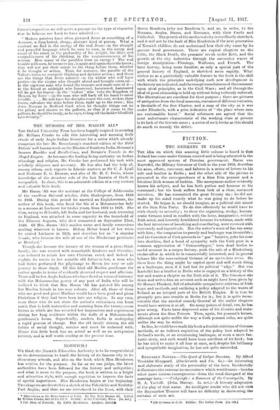THE. MEMOIRS OF MRS. HASSAN ALL*
Tillg Oxford University Press has been happily inspired in securing Mr. William Crooke to edit this interesting and amusing little classic of early Anglo-Indian literature for a series which already comprises the late Mr. Beauchamp's standard edition of the AMA Dubois' well-known work on the Hindus of Southern India, Sleeman's famous Rambles and Recollections, and Bernier's Travels in the Mogul Empire. As becomes the leading living authority on Indian ethnology and religion, Mr. Crooke has performed his task with iteholarly diligence and accuracy. He has also had the help of, among others, such experts in Islamic matters as Sir C. J. Lyall mid Professor E. 0. Browne, and also of Mr. II. C. Irwin, whose knowledge of the decadent rule of the last Nawabs of Oath is unequalled. In short, this is an admirable edition of a very curious and valuable little book.
Mir Hasan 'Ali was the assistant at the College of Addiscombe of the excellent Oriental scholar, John Shakespeare, from 1810 to 1816. During tide period he married an Englishwoman, the author of this book, who lived the life of a Mohammedan lady in a amens at Lueknow for twelve years, from 181G to 1828. She then, owing to ill-health, left India and her husband, and, returning to England, was attached in some capacity to the household of the Princess Augusta, who died unmarried on September 22nd, 1840. Of Mrs. Masan 'Alt's maiden name and family connexions nothing whatever is known. Bishop Heber heard of her when he visited Lucknow in 1821, and describes her as "a singular testate, who became the wife of one of the Hindustani professors at Hertford."
Though she became the inmate of the ...nano of a pious Slash family, she was treated with remarkable kindness and liberality. was suffered to retain her own Christian creed, and indeed to explain its tenets to her amiable old father-in-law, a man who had thrice performed the pilgrimage to Mecca (no easy or safe journey in those days). Of this kind old Muslim gentleman the outlaw speaks in terms of evidently deserved respect and affection. There will be few Anglo-Indians who have lived on terms of intimacy with the Mohammedan gentry of any part of India who will be inclined to think that Airs. If asan 'All has painted life among her Muslim friends in too rosy colours. After all, those of them who are good and pious Muslims would have been good and pious Christians if they had been born into our religion. In any case, even those who do not share the author's enthusiasm can learn much that is both instructive and mousing from the twenty-seven letters in which she has recorded her impressions and experiences during her long residence within the walls of a Mohammedan gentleman's home. Superficially, modern India is undergoing a rapid process of change. But the old family virtues, the old Iodine of social thought, survive and must be reckoned with. Hence this little book has an actual as well as an antiquarian interest, and is well worth reading at the present time.


























 Previous page
Previous page